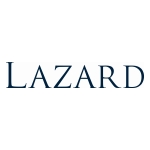Lazard Releases 2020 Global Healthcare Leaders Study

– Most healthcare industry leaders expect the pandemic to continue into the second half of 2021 or beyond –
NEW YORK–(BUSINESS WIRE)–Lazard Ltd (NYSE: LAZ) today released its third annual in-depth study of strategic challenges and opportunities in the global healthcare industry, surveying C-level executives and investors across three global sectors: Pharmaceuticals and Biotech; MedTech; and Healthcare Services. This year’s study focuses on the industry leaders’ response to the COVID-19 pandemic, including their greatest concerns, challenges, and expectations.
The survey, conducted during the last week of May and first half of June 2020, revealed that almost two-thirds of healthcare industry leaders expect the pandemic to continue into the second half of 2021 or beyond – a notably longer time frame than that expressed by many government leaders. The healthcare leaders’ opinions are driven mainly by their expectations for the development of an effective vaccine, which almost three-quarters of them believe will not be widely available until the second half of 2021 or later.
“Healthcare industry leaders’ single biggest concern is the availability of an effective vaccine to prevent infections. They are sober about the length of time it will likely take to develop widely available effective vaccines to bring the COVID-19 pandemic under control, and they expect this will not happen until well into 2021, if not later,” said David Gluckman, Global Head of Lazard’s Healthcare Group. “On the other hand, most are optimistic that there will be a widely available vaccine. We are seeing unprecedented levels of effort, collaboration and capital invested at risk to accelerate finding a solution.”
“Although larger strategic transactions for healthcare companies have become more difficult during this period due to factors such as valuation uncertainty, the majority of executives believe the pause will be followed by a surge in activity beginning in 2021,” said Stephen Sands, Chairman of Lazard’s Global Healthcare Group. “Strategic imperatives that were relevant before the downturn – the need to propel growth and innovation – will remain the main catalysts for M&A in the mid and long term.”
The study offers a variety of insights, including the following selected highlights:
- 71% of healthcare leaders say the availability of a vaccine is a top concern. 66% put the probability for a widely available effective vaccine at above 50%. Slightly less than one-third put it at between 76% and 100%. Only 9% put the probability at less than 25%.
- Views on the likelihood of an effective therapeutic treatment diverge widely. Only 49% of healthcare industry leaders put the likelihood of such a therapeutic at greater than 50%. About one-fifth cite a 76% to 100% likelihood. But another one-fifth cite only a 1% to 25% likelihood.
- Healthcare leaders expect a pause in deal activity in 2020 and then a surge in 2021 and beyond, with expectations varying by deal type. 89% believe large deal activity will be flat to down in 2020 relative to 2019. As many respondents say smaller deal and alliance activity will be down in 2020 as those who say it will be up. 40% expect smaller deal activity to be down versus 37% who say it will be up. 34% say alliance activity will be down versus 37% who say it will be up.
- Healthcare leaders cite confidence that the pandemic is resolving (52%) and confidence in an economic rebound (45%) as the top two factors that will catalyze a rebound in healthcare M&A. These are followed closely by underlying drivers of M&A that remain strategic priorities: the need for growth and innovation (39% and 38%, respectively). Respondents also cite a return to reasonable price levels and expectations (35%), and the opportunity to diversify or strengthen competitive position (31%).
- Respondents’ top descriptions of a post-pandemic “new normal” for the U.S. healthcare system focus on more efficient delivery of healthcare to the patient: 75% of respondents expect significantly greater use of virtual healthcare delivery; 40% expect an acceleration of remote patient monitoring; 35% expect increased delivery of healthcare in the home and other alternate sites; and 28% expect greater importance of data analytics, artificial intelligence and machine learning.
The Global Healthcare Leaders Study surveyed 184 C-level executives and 37 investors across
three sectors: Biopharmaceuticals; Medical Devices and Diagnostics; and Healthcare Services. These 221 healthcare leaders represent many of the largest healthcare entities globally, smaller public and private companies, and prominent investment firms.
The Global Healthcare Leaders Study reflects Lazard’s approach to long-term thought leadership, commitment to the sectors in which it participates, and focus on intellectual differentiation. An executive summary of the Study is posted at www.lazard.com/perspective.
Lazard’s Global Healthcare Group advises senior executives and boards of directors on strategic M&A, corporate preparedness, capital advisory, and other strategic and financial matters. The group is active in all areas of the healthcare and life sciences industry, including pharmaceuticals, biotechnology, healthcare services, and medical devices.
ABOUT LAZARD
Lazard, one of the world’s preeminent financial advisory and asset management firms, operates from more than 40 cities across 25 countries in North America, Europe, Asia, Australia, Central and South America. With origins dating to 1848, the firm provides advice on mergers and acquisitions, strategic matters, restructuring and capital structure, capital raising and corporate finance, as well as asset management services to corporations, partnerships, institutions, governments and individuals. For more information on Lazard, please visit www.lazard.com. Follow Lazard at @Lazard.
Contacts
Media contacts:
Judi Mackey
judi.mackey@lazard.com
+1 212 632 1428
Clare Pickett (US)
clare.pickett@lazard.com
+1 212 632 6963
Jenna Ward (UK)
jenna.ward@lazard.com
Coralie Savin (France)
coralie.savin@lazard.com
